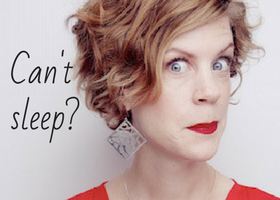
Sleepless Nights
Since I was a toddler, I’ve been a poor sleeper.
I was a light sleeper, so that when my mom would come check on me I would have already heard her and be standing up in my crib. As a child, my parents would let me read late in the hopes that I would get sleepy and nod off. In reality, I would finish books overnight and my mind would be racing with the adventures I had read about.
As a university student I would party late, study late and generally did things that students do. I flipped my days and nights around a bit. As an adult I suffered from insomnia; on occasion I would go a whole night without sleeping. Usually I struggled to get to sleep, or if I woke up I wouldn’t be able to get back to sleep.
What was Happening?
There may be physical reasons we can’t sleep (disease, medication etc), environmental reasons (what’s happening around you), but for me it was internal. What do I mean?
One of the main things was stress; when I look back on my life, I was a bit of a stressy kid. Things didn’t go the way I wanted them to go and I didn’t learn how to deal with it well. I didn’t learn how to shut off and relax.
Stress continues to be the main factor when I can’t sleep, but I have certainly learned some great ways to deal with that.
What Happens in the Body?
When we are under stress, the body reacts as if it’s faced by a great danger that threatens survival. It goes into survival mode by doing several different things:
- Our pupils dilate (to see better)
- Sending the main blood flow to the brain, heart and muscles (for quick thinking and action)
- Expanding our lungs (for more oxygen to act)
- Increases blood output
- Releases glucose (for energy)
This reaction by the body does save lives in extreme situations and you might recognise it as the ‘Fight, Flight or Freeze’ reaction. The thing is, like most people, I’ve never been in a life threatening situation (thankfully).
When it Goes Wrong
Not ever having been in a life threatening situation, this ‘natural’ reaction was preventing me from sleeping. It was also affecting my digestion. The typical things that happen when your body is in ‘Fight, Flight or Freeze’ mode are:
- Dry mouth and pupils don’t constrict as normal – This is due, in part, to an imbalance of the hormone aldosterone, which alters during stress
- Heartbeat speeds up – Anxiety may also increase, but I used to get palpitations that doctors couldn’t explain
- Flow to the gut is interrupted – Digestion is unnecessary for short-term survival if your life is under threat. I used to get bloating, diarrhoea and gas and some people also suffer from constipation, poor digestion of fats etc
- Inappropriate sugar balancing – Huge amounts of glucose are released for energy, but you don’t need this so you get fluctuations. Blood sugar issues were my middle name in my 20’s and I felt dizzy standing up quickly, weak if I didn’t eat often, craved sugar/bread/pasta and was easily irritable. Plus, sugar levels interrupted my sleep!
- Nutrient status changes – Over time, stress means toxicity in the body and it works overtime to protect you from it. The liver and kidneys are detoxifying and the adrenal glands are spouting out cortisol (which prevents sleep and upsets blood sugar further). The adrenal glands use up a lot of B5 (and cofactors), vitamin C, magnesium and zinc.
- Other symptoms can include: difficulty concentrating, depression, poor memory, incontinence and low libido
5 Foods I Eat to Improve my Sleep
There are many different approaches to be taken to improve your sleep; it’s not usually just one thing that interferes with sleep. If you haven’t read it yet, see the interview I did with Sleep Psychologist, Katerine Nikolakopoulou, a few weeks ago. She talks about certain ways you can change your habits and therapies you can use. In the meantime, don’t neglect your diet. Food has a GREAT influence on your health and my sleep is a testament to that.
Wholegrains
These provide vitamin B5 and B6, both important for your adrenal glands so you can improve your sleep
Green leafy vegetables
A great source of the folic acid (B9) that helps your brain function and keeps your nerves steady. Kale, spinach and red/green salad leaves are examples.
Seeds
Seeds supply you with the large amount of magnesium to help relax muscles and zinc and vitamins B1, B3 and B6, which also support your adrenal health. Sunflower, linseed/flaxseed and sesame seeds are good examples.
Meat and dairy
These and also eggs contain a lot of energy giving nutrients. There may be reasons why you avoid them, but if you struggle with stress and sleep you need to get the protein and B vitamins (especially B12) from other sources. I personally try to buy organic, free-range because of the better treatment of the animals (I realise this is a contentious subject so please follow your heart on this)
Colourful fruit and vegetables
These add many nutrients and fibre to your diet, but specifically the amounts of vitamin C and zinc that you need to support good stress-balancing health. Most of you know that vitamin C comes from citrus fruits, but you can also get it from watercress, peppers, strawberries, kiwis, broccoli, black currants, Brussel sprouts, cabbage, cauliflower, kale, peas…well, you get the idea! Try all the colours in the rainbow each day to cover it more easily!

